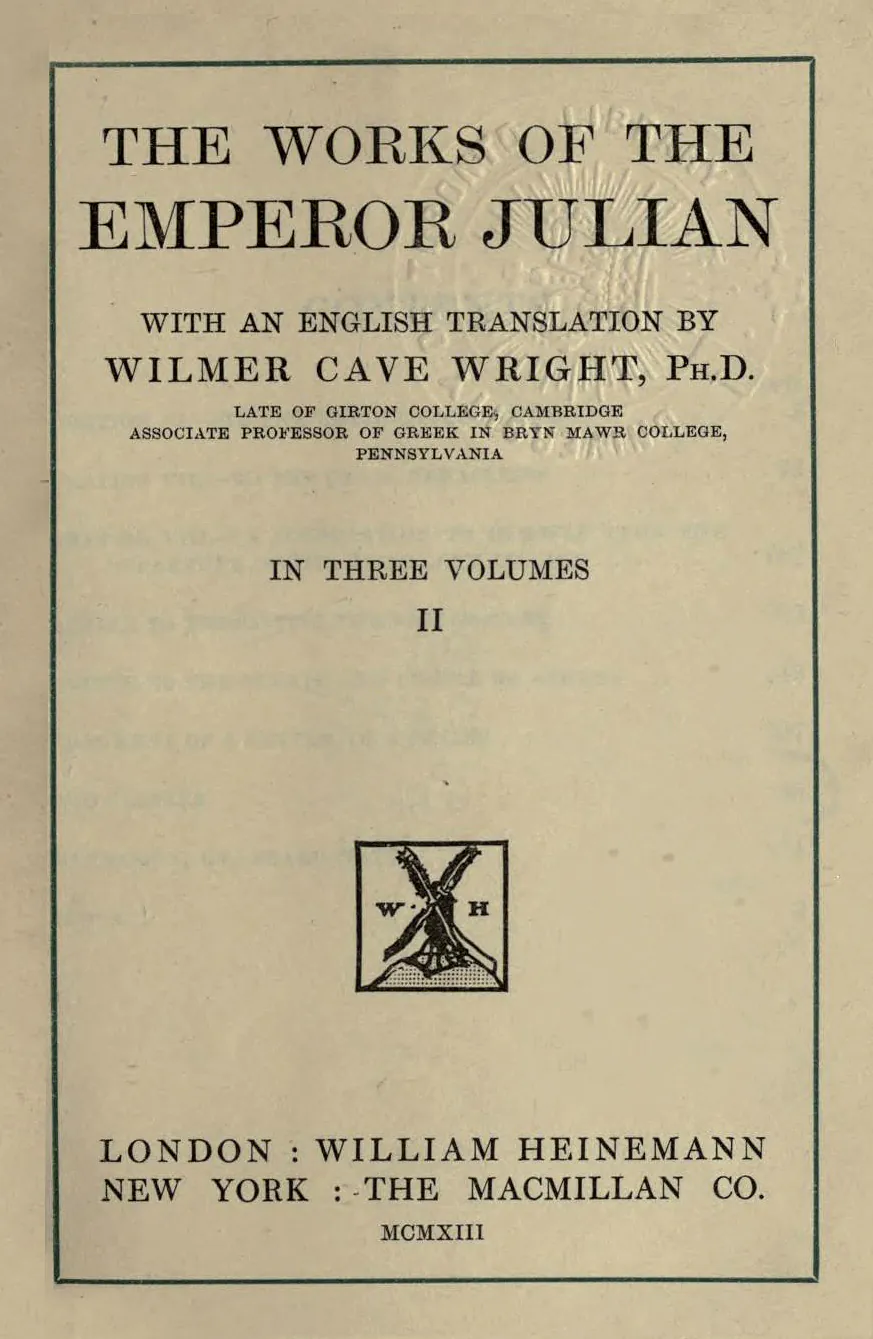[A]
πολλὴν ἂν ἐποιήσατο προμήθειαν, ὅπως ὅ,τι μάλιστα ὑμῖν φανείην κεχαρισμένος.
Εἶτα οὐκ ἔξεστιν ἀποθέσθαι νῦν καὶ μεταμαθεῖν εἴ τι πρότερον ἡμῖν ἄγροικον ἦθος ἐνετράφη; Ἔθος, φασί, δευτέρη φύσις· φύσει μάχεσθαι δ ̓ ἔργον, ἐτῶν τριάκοντα μελέτην ἀφεῖναι παγχάλεπον ἄλλως τε καὶ μετὰ τοσαύτης ἐγγενομένην τῆς χαλεπότητος· ἐμοὶ δὲ ἤδη πλείω τούτων ἐστίν. Εἶεν·
[B]
ἀλλὰ τί παθὼν αὐτὸς ἐπιχειρεῖς ἀκροᾶσθαι περὶ τῶν συμβολαίων καὶ δικάζειν; οὐ γὰρ δὴ καὶ τοῦτό σε ὁ παιδαγωγὸς ἐδίδασκεν, ὃς οὐδ ̓ εἰ ἄρξεις ἠπίστατο. Δεινὸς δὲ ἀνέπεισε γέρων, ὃν καὶ ὑμειῖς ὡς ὄντα μάλιστα αἰτιώτατον τῶν ἐμῶν ἐπιτηδευμάτων ὀρθῶς ποιοῦντες ξυλλοιδορεῖτέ μοι, καὶ τοῦτον δ ̓, εὖ ἴστε, ὑπ ̓ ἄλλων ἐξηπατημένον. ὀνόματα ἥκει πρὸς ὑμᾶς πολλάκις κωμῳδούμενα, Πλάτων καὶ Σωκράτης καὶ Ἀριστοτέλης καὶ Θεόφραστος.
[C]
ἐκείνοις ὁ γέρων οὗτος πεισθεὶς ὑπ ̓ ἀφροσύνης, ἔπειτα ἐμὲ νέον εὑρών, ἐραστὴν λόγων, ἀνέπεισεν, ὡς, εἰ τὰ πάντα ἐκείνων ζηλωτὴς γενοίμην, ἀμείνων ἔσομαι τῶν μὲν ἄλλων ἀνθρώπων ἴσως οὐδενός· οὐ γὰρ εἶναί μοι πρὸς αὐτοὺς τὴν ἅμιλλαν· ἐμαυτοῦ δὲ πάντως. ἐγὼ δέ· οὐ γὰρ εἶχον ὅ,τι ποιῶ· πεισθεὶς οὐκέτι δύναμαι μεταθέσθαι, καὶ ταῦτα ἐθέλων πολλάκις,
[D]
ἀλλ ̓ ὀνειδίζω μὲν ἐμαυτῷ, διότι μὴ ποιῶ πᾶσιν ἄδειαν1πᾶσιν ἄδειαν Cobet, πᾶσι πᾶσαν ἄδειαν Hertlein, MSS. ἁπάντων ἀδικημάτων· ὕπεισι δέ με ἐκ τῶν Πλάτωνος ὅσα ὁ Ἀθηναῖος διεξῆλθε ξένος, “Τίμιος μὲν δὴ καὶ ὁ μηδὲν ἀδικῶν, ὁ δὲ μηδ ̓ ἐπιτρέπων τοῖς ἀδικοῦσιν ἀδικεῖν πλέον ἢ διπλασίας τιμῆς ἄξιος ἐκείνου· ὁ μὲν γὰρ ἑνός, ὁ δὲ πολλῶν ἀντάξιος ἑτέρων, μηνύων τὴν τῶν ἄλλων τοῖς ἄρχουσιν ἀδικίαν. ὁ δὲ καὶ συγκολάζων εἰς δύναμιν τοῖς ἄρχουσιν,
[A]
But perhaps if my tutor had foreseen this he would have exercised much forethought to the end that I might, as far as possible, seem agreeable in your eyes.
What then, you will ask, is it not possible even now for me to lay aside my character, and to repent of the boorish temper that was bred in me in earlier days? Habit, as the saying goes, is second nature. But to fight with nature is hard; and to shake off the training of thirty years is very difficult, especially when it was carried on with such painful effort, and I am already more than thirty years old.
[B]
“Well and good,” you answer, “but what is the matter with you that you try to hear and decide cases about contracts? For surely your tutor did not teach you this also, since he did not even know whether you would govern.” Yes, it was that terrible old man who convinced me that I ought to do so; and you also do well to help me to abuse him, since he is of all men most responsible for my way of life; though he too, you must know, had in his turn been misled by others. Theirs are names that you have often met when they are ridiculed in Comedy – I mean Plato and Socrates, Aristotle and Theophrastus.
[C]
This old man in his folly was first convinced by them, and then he got hold of me, since I was young and loved literature, and convinced me that if I would emulate those famous men in all things I should become better, not perhaps than other men – for it was not with them that I had to compete – but certainly better than my former self. Accordingly, since I had no choice in the matter, I obeyed him, and now I am no longer able to change my character, though indeed I often wish I could,
[D]
and I blame myself for not granting to all men impunity for all wrong-doing. But then the words of the Athenian stranger in Plato occur to my mind: “Though he who does no wrong himself is worthy of honour, he who does not allow the wicked to do wrong is worthy of more than twice as much honour. For whereas the former is responsible for one man only, the latter is responsible for many others besides himself, when he reports to the magistrates the wrong-doing of the rest.



